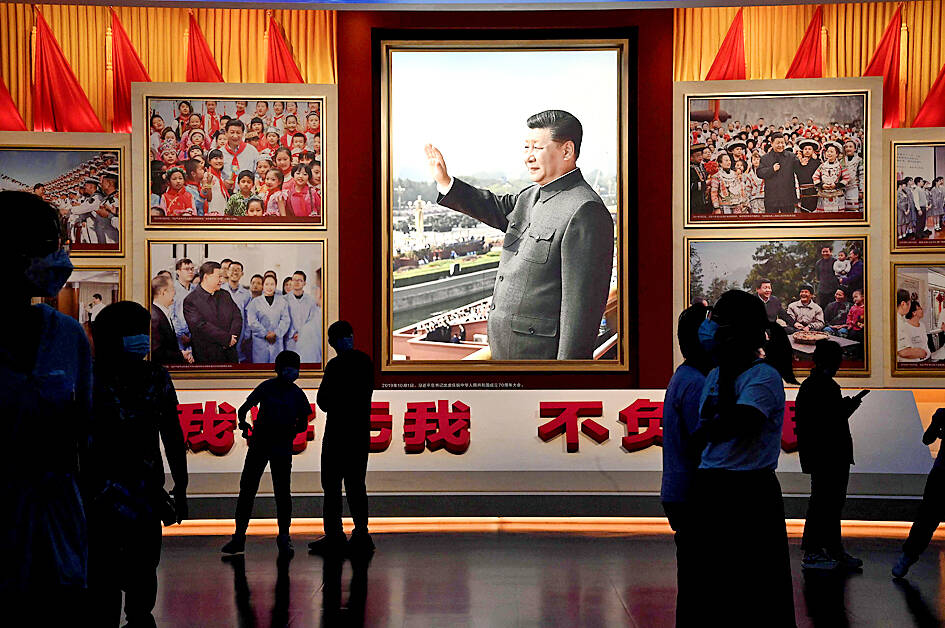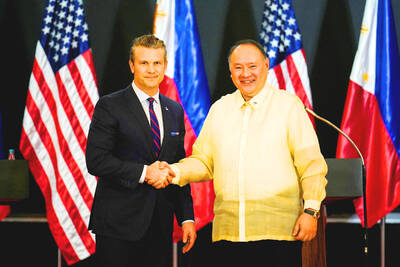Chinese President Xi Jinping (習近平) is to visit Kazakhstan next week for a state visit, Interfax reported, in what would be his first trip overseas in more than two-and-a-half years.
Xi accepted the Kazakh President Kassym-Jomart Tokayev’s invitation to visit the Central Asian nation on Wednesday next week, the Russian news agency reported, citing Kazakh Ministry of Foreign Affairs spokesman Aibek Smadiyarov.
The two leaders would sign a variety of agreements during the visit, it added.

Photo: AFP
The Chinese Ministry of Foreign Affairs did not respond to a request for comment.
The trip would mark a return to the world stage for Xi, the only G20 leader who has not traveled abroad throughout the COVID-19 pandemic. While Xi made a brief visit to Hong Kong in July, he has not set foot outside Chinese territory since January 2020.
The timing would be unusual even in pre-pandemic times. Chinese leaders rarely travel abroad in the months of intense domestic politicking before the Chinese Communist Party’s twice-a-decade National Congress, which is set to start in Beijing on Oct. 16. Xi is widely expected to secure a precedent-breaking third term at the gathering.
Yet geopolitical tensions are running high in the wake of US House of Representatives Speaker Nancy Pelosi’s trip to Taiwan last month. China responded by conducting live-fire military drills around Taiwan. Beijing has sought to gain diplomatic support for its position on Taiwan, pushing back on calls by the US and its allies to exercise restraint.
Xi might also attend a meeting of the Shanghai Cooperation Organization scheduled for Thursday and Friday next week in neighboring Uzbekistan. The group, which China sees as a counter to Western alliances, also includes Russia, India, Pakistan and other Central Asian nations.
Niva Yau (邱芷恩), a senior researcher at the OSCE Academy in Bishkek, Kyrgyzstan, said for Xi Central Asia is the “perfect pivot” for whatever is to come regarding Taiwan and any other developments in East Asia.
Another, more practical reason for selecting Kazakhstan is that it is the most important country for China to continue its Xinjiang policy, Yau added.
“If there’s any country that can make a difference regarding what China does in Xinjiang with the Turkic population there, it would be Kazakhstan,” she said.
It is also a strategic mineral source: Kazakhstan has 40 percent of the world’s uranium, which could become increasingly important as developed countries look to atomic energy as a reliable source of zero-carbon power in the coming decades.

‘EYE FOR AN EYE’: Two of the men were shot by a male relative of the victims, whose families turned down the opportunity to offer them amnesty, the Supreme Court said Four men were yesterday publicly executed in Afghanistan, the Supreme Court said, the highest number of executions to be carried out in one day since the Taliban’s return to power. The executions in three separate provinces brought to 10 the number of men publicly put to death since 2021, according to an Agence France-Presse tally. Public executions were common during the Taliban’s first rule from 1996 to 2001, with most of them carried out publicly in sports stadiums. Two men were shot around six or seven times by a male relative of the victims in front of spectators in Qala-i-Naw, the center

Canadian Prime Minister Mark Carney is leaning into his banking background as his country fights a trade war with the US, but his financial ties have also made him a target for conspiracy theories. Incorporating tropes familiar to followers of the far-right QAnon movement, conspiratorial social media posts about the Liberal leader have surged ahead of the country’s April 28 election. Posts range from false claims he recited a “satanic chant” at a campaign event to artificial intelligence (AI)-generated images of him in a pool with convicted sex offender Jeffrey Epstein. “He’s the ideal person to be targeted here, for sure, due to

DISPUTE: Beijing seeks global support against Trump’s tariffs, but many governments remain hesitant to align, including India, ASEAN countries and Australia China is reaching out to other nations as the US layers on more tariffs, in what appears to be an attempt by Beijing to form a united front to compel Washington to retreat. Days into the effort, it is meeting only partial success from countries unwilling to ally with the main target of US President Donald Trump’s trade war. Facing the cratering of global markets, Trump on Wednesday backed off his tariffs on most nations for 90 days, saying countries were lining up to negotiate more favorable conditions. China has refused to seek talks, saying the US was insincere and that it

The US will help bolster the Philippines’ arsenal and step up joint military exercises, Manila’s defense chief said, as tensions between Washington and China escalate. The longtime US ally is expecting a sustained US$500 million in annual defense funding from Washington through 2029 to boost its military capabilities and deter China’s “aggression” in the region, Philippine Secretary of Defense Gilberto Teodoro said in an interview in Manila on Thursday. “It is a no-brainer for anybody, because of the aggressive behavior of China,” Teodoro said on close military ties with the US under President Donald Trump. “The efforts for deterrence, for joint resilience